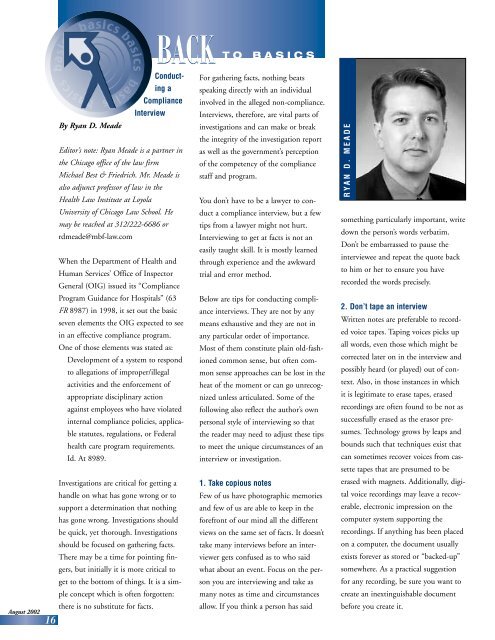JR - Health Care Compliance Association
JR - Health Care Compliance Association
JR - Health Care Compliance Association
Create successful ePaper yourself
Turn your PDF publications into a flip-book with our unique Google optimized e-Paper software.
BACK<br />
TO BASICS<br />
For gathering facts, nothing beats<br />
16<br />
Conduct-<br />
August 2002<br />
there is no substitute for facts.<br />
allow. If you think a person has said<br />
ing a<br />
<strong>Compliance</strong><br />
Interview<br />
speaking directly with an individual<br />
involved in the alleged non-compliance.<br />
Interviews, therefore, are vital parts of<br />
By Ryan D. Meade<br />
investigations and can make or break<br />
the integrity of the investigation report<br />
Editor’s note: Ryan Meade is a partner in<br />
the Chicago office of the law firm<br />
Michael Best & Friedrich. Mr. Meade is<br />
as well as the government’s perception<br />
of the competency of the compliance<br />
staff and program.<br />
also adjunct professor of law in the<br />
<strong>Health</strong> Law Institute at Loyola<br />
University of Chicago Law School. He<br />
may be reached at 312/222-6686 or<br />
rdmeade@mbf-law.com<br />
You don’t have to be a lawyer to conduct<br />
a compliance interview, but a few<br />
tips from a lawyer might not hurt.<br />
Interviewing to get at facts is not an<br />
easily taught skill. It is mostly learned<br />
When the Department of <strong>Health</strong> and<br />
Human Services’ Office of Inspector<br />
through experience and the awkward<br />
trial and error method.<br />
General (OIG) issued its “<strong>Compliance</strong><br />
Program Guidance for Hospitals” (63<br />
FR 8987) in 1998, it set out the basic<br />
seven elements the OIG expected to see<br />
in an effective compliance program.<br />
One of those elements was stated as:<br />
Development of a system to respond<br />
to allegations of improper/illegal<br />
activities and the enforcement of<br />
appropriate disciplinary action<br />
against employees who have violated<br />
internal compliance policies, applicable<br />
statutes, regulations, or Federal<br />
health care program requirements.<br />
Id. At 8989.<br />
Investigations are critical for getting a<br />
handle on what has gone wrong or to<br />
support a determination that nothing<br />
has gone wrong. Investigations should<br />
be quick, yet thorough. Investigations<br />
should be focused on gathering facts.<br />
There may be a time for pointing fingers,<br />
but initially it is more critical to<br />
get to the bottom of things. It is a simple<br />
concept which is often forgotten:<br />
Below are tips for conducting compliance<br />
interviews. They are not by any<br />
means exhaustive and they are not in<br />
any particular order of importance.<br />
Most of them constitute plain old-fashioned<br />
common sense, but often common<br />
sense approaches can be lost in the<br />
heat of the moment or can go unrecognized<br />
unless articulated. Some of the<br />
following also reflect the author’s own<br />
personal style of interviewing so that<br />
the reader may need to adjust these tips<br />
to meet the unique circumstances of an<br />
interview or investigation.<br />
1. Take copious notes<br />
Few of us have photographic memories<br />
and few of us are able to keep in the<br />
forefront of our mind all the different<br />
views on the same set of facts. It doesn’t<br />
take many interviews before an interviewer<br />
gets confused as to who said<br />
what about an event. Focus on the person<br />
you are interviewing and take as<br />
many notes as time and circumstances<br />
RYAN D. MEADE<br />
something particularly important, write<br />
down the person’s words verbatim.<br />
Don’t be embarrassed to pause the<br />
interviewee and repeat the quote back<br />
to him or her to ensure you have<br />
recorded the words precisely.<br />
2. Don’t tape an interview<br />
Written notes are preferable to recorded<br />
voice tapes. Taping voices picks up<br />
all words, even those which might be<br />
corrected later on in the interview and<br />
possibly heard (or played) out of context.<br />
Also, in those instances in which<br />
it is legitimate to erase tapes, erased<br />
recordings are often found to be not as<br />
successfully erased as the erasor presumes.<br />
Technology grows by leaps and<br />
bounds such that techniques exist that<br />
can sometimes recover voices from cassette<br />
tapes that are presumed to be<br />
erased with magnets. Additionally, digital<br />
voice recordings may leave a recoverable,<br />
electronic impression on the<br />
computer system supporting the<br />
recordings. If anything has been placed<br />
on a computer, the document usually<br />
exists forever as stored or “backed-up”<br />
somewhere. As a practical suggestion<br />
for any recording, be sure you want to<br />
create an inextinguishable document<br />
before you create it.

















